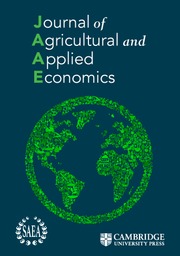Article contents
Incentives Matter: Assessing Biofuel Policies in the South
Published online by Cambridge University Press: 26 January 2015
Abstract
As a result of the increase in the real cost of fossil fuel-based energy in recent years, federal and state governments have taken a more active role in energy policy by creating incentives to develop alternative sources of energy, including biofuels. However, policymakers often become focused on the specific type of energy and not the energy services consumers ultimately value. The lack of recognition of energy as a commodity results in policies that ignore the characteristics of the associated markets: easy entry and exit, no barriers to entry, and sensitivity to changes in supply and demand. Consequently, energy industries may fail to arise because entrepreneurs must be able to account for all costs and earn—at a minimum—a competitive return on the investment. This article evaluates the options available to policymakers related to biofuels, which are of particular concern to the South, and includes an assessment of the knowledge base on which policy decisions are made.
- Type
- Invited Paper Sessions
- Information
- Copyright
- Copyright © Southern Agricultural Economics Association 2011
References
- 2
- Cited by




